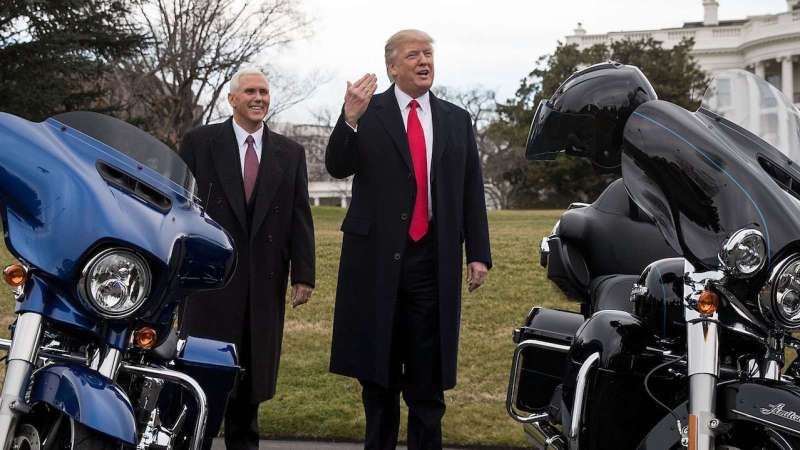Donald Trump spent much of Tuesday ranting about Harley-Davidson. Having expressed surprise on Monday night that the motorcycle manufacturer “would be the first to wave the White Flag” over Trump’s trade war by annoucing the move of a production line outside the US, Trump raved yesterday:
Early this year Harley-Davidson said they would move much of their plant operations in Kansas City to Thailand. That was long before Tariffs were announced. Hence, they were just using Tariffs/Trade War as an excuse. Shows how unbalanced & unfair trade is, but we will fix it…..
— Donald J. Trump (@realDonaldTrump) June 26, 2018
Later in the day, Trump was threatening, “Harley must know that they won’t be able to sell back into U.S. without paying a big tax!”, and he continued Wednesday: “We won’t forget, and neither will your customers or your now very HAPPY competitors!”
Trump’s agitation, if not necessarily his manner of expression, is understandable. Harley Davidson’s decision is just one marker of how the Administration’s protectionism — sweeping tariffs on China, duties on steel and aluminum from allies like Canada and the European Union, threats to rip up the North American Free Trade Agreement, Trump’s warning that he could block German auto imports — is already wreaking economic damage, not on its targets but on the US.
The Fallout Begins
Harley-Davidson’s announcement may have surprised Trump, but the path to it is all too clear. The EU did not take the 25% steel and 10% aluminum tariffs lying down. Instead, it raised duties on a range of US products, including an increase from 6% to 31% on motorcycles — a cost of about per cycle exported from the US to the EU. Harley Davidson said:
The tremendous cost increase, if passed onto its dealers and retail customers, would have an immediate and lasting detrimental impact to its business in the region, reducing customer access to Harley-Davidson products and negatively impacting the sustainability of its dealers’ businesses.
But by moving production outside America, the manufacturer could avoid the tariff shock. Saying the shift would be complete within nine to 18 months, Harley-Davidson was clear in its rationale:
Increasing international production to alleviate the EU tariff burden is not the company’s preference, but represents the only sustainable option to make its motorcycles accessible to customers in the EU and maintain a viable business in Europe. Europe is a critical market for Harley-Davidson.
Harley-Davidson’s purpose is to fulfill dreams of personal freedom for customers who live in the European Union and across the world, and the company remains fully engaged with government officials in both the US and the EU helping to find sustainable solutions to trade issues and rescind all tariffs that restrict free and fair trade.
And the tariff effects are rippling elsewhere. Missouri’s Mid-Continent Nail, America’s largest nail manufacturer, laid off 60 of its 500 employees on June 15 and said it expects to lay off 200 more in coming days.
Mid-Continent had been importing Mexican steel. Sales halved in just two weeks after the company raised prices to cope with the increased steel costs.
Mid-Continent spokesman James Glassman said the company is now “on the brink of extinction” unless the Commerce Department grants its request for a tariff exclusion. Another option is relocation to Mexico.
The Tax Foundation predicts almost 50,000 job losses from the Trump tariffs. This will soar to more than 250,000 job losses if Trump proceeds with duties on another $200 billion of Chinese products.
The Trump camp is counting on news of gains such as almost 4,700 reclaimed positions in the steel industry. An hour away from Mid-Continent Nail, Magnitude 7 Metals is restarting an aluminum product line, giving 450 workers back their jobs.
But right now the economic balance on the ledger is in the red over Trump’s protectionist gamble. And, with China and the EU targeting states that Trump won in the 2016 election, his electoral balance and those of the Republican Party may also soon show a loss.

